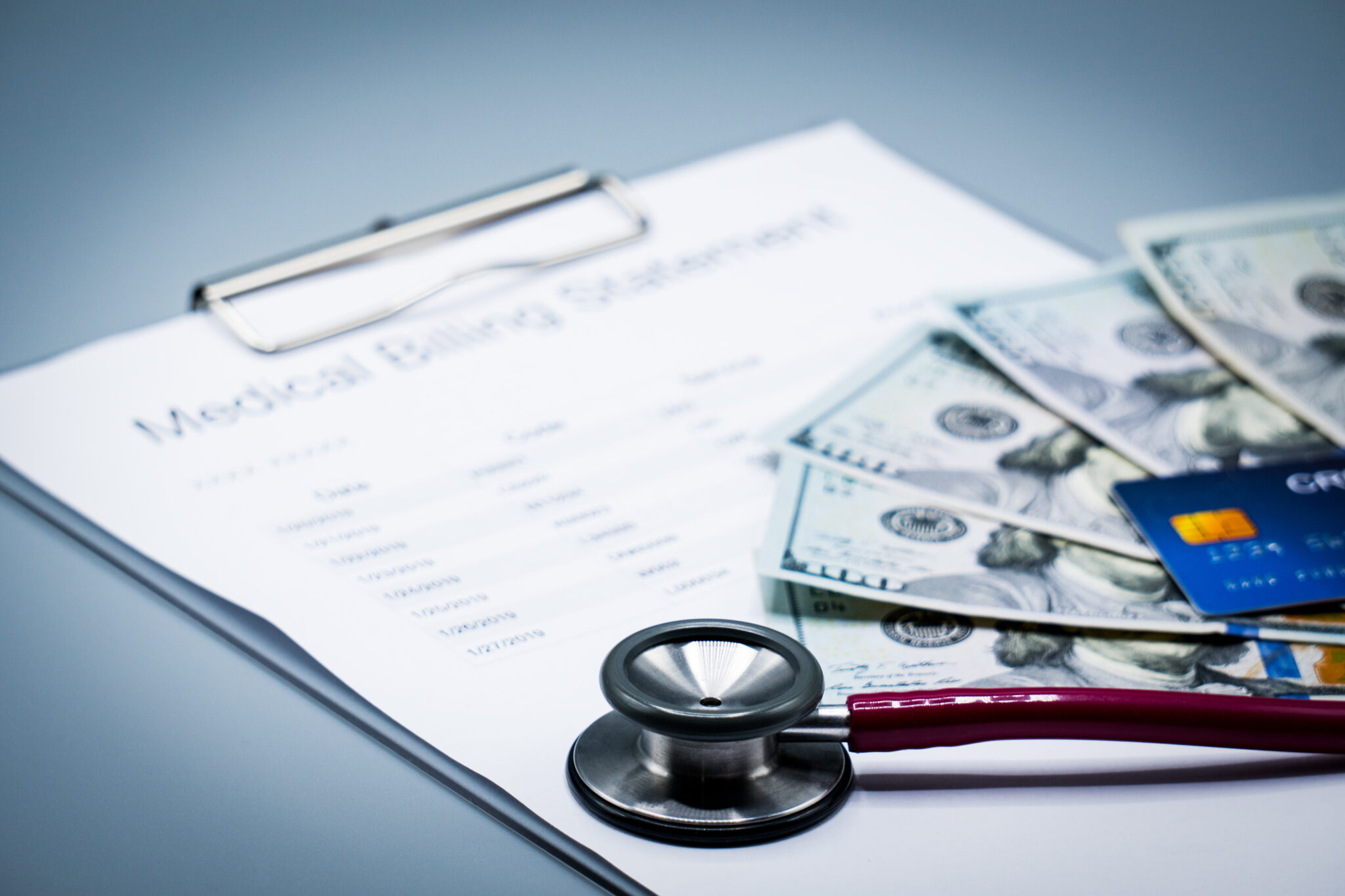Paying Medical Bills: Installment Loans Vs. Credit Cards
Life doesn’t always go according to plan, and few things can derail a budget like a sudden medical emergency. Whether it’s a trip to the ER, a necessary surgery, or an unplanned dental procedure, unexpected medical expenses are stressful, both emotionally and financially.
According to a 2023 survey by the Kaiser Family Foundation, nearly 41% of adults in the U.S. carry some form of medical debt. So, if you’re wondering how to pay medical expenses, you’re far from alone.
This article breaks down two of the most common healthcare financing options—installment loans and credit cards—and helps you understand which might be the best way to pay medical bills based on your unique situation.
Common Ways To Pay For Medical Expenses
There’s no one-size-fits-all approach when it comes to choosing a payment method for medical expenses, but some of the most common options include:
- Personal savings – Ideal, but not always available.
- Credit cards – Fast access but can come with high interest rates.
- Installment loans – Structured payments over time with fixed terms.
- Payment plans through providers – Some hospitals offer these directly.
- Medical credit cards – Designed specifically for health-related spending, but may carry deferred interest traps.
Each method has its pros and cons. Understanding the differences is key to making the best financial decision for your health and wallet.
Installment Loans For Medical Expenses
What They Are
Discussing financing options for healthcare, installment loans are personal loans that allow borrowers to pay for large expenses, like medical bills, over a set period of time. You borrow a fixed amount and repay it through regular monthly payments, usually with a fixed interest rate.
Unlike revolving credit (like a credit card), installment loans provide a lump sum upfront and don’t replenish once you make payments. Once the loan is paid off, the agreement ends.
How They Work
When you apply for an installment loan, the lender assesses your creditworthiness based on your credit score, income, and debt-to-income ratio. Upon approval:
- You receive a lump sum deposit.
- You use it to pay off medical bills directly.
- You repay the loan in fixed monthly payments over a predetermined term, often 12 to 60 months.
Pros & Cons
While installment loans can offer peace of mind and predictable payments, they’re not without drawbacks.
Pros:
- Fixed interest rates and payments
- No revolving debt
- May offer lower APRs than credit cards
- Can consolidate multiple bills into one loan
Cons:
- Approval may require good credit
- Prepayment penalties in some cases
- Loan adds to the overall debt load
When They Might Be A Good Fit
Regarding loans vs credit cards for healthcare, loans are a solid option if:
- You’re facing high medical costs that you can’t pay upfront
- You need structured repayment terms
- You prefer knowing exactly how much you’ll owe each month
They’re also ideal for individuals who want to avoid the temptation of ongoing credit card use and prefer a “one-and-done” financing approach.
Flexible Options For Unexpected Costs
Learn More
Credit Cards For Medical Bills
Credit cards are one of the most common financing options for healthcare, especially when emergencies require immediate payment. They offer instant access to funds, and most medical providers accept them.
Many people opt for credit cards simply because they already have them in hand. Some even use medical credit cards, which are specialized cards that may offer promotional interest-free periods for specific medical procedures.
However, using credit cards for medical bills isn’t always the best way to pay medical bills, especially if you carry a balance from month to month.
Interest rates and minimum payments
One of the key factors to understand is how credit card debt works:
- Average APRs range from 17% to 30% (as of 2024), depending on credit score and card type.
- Minimum payments may be as low as 1%–3% of the balance, which can stretch debt repayment for years.
- Deferred interest on medical cards can become retroactive if the balance is not paid in full by the promotional deadline.
If you can pay off your balance quickly, a credit card might serve as a convenient short-term solution. But long-term usage can lead to compounding interest and growing balances.
Risks of high balances
Carrying high credit card balances to pay for medical care can result in:
- Lower credit scores due to high credit utilization
- Mounting interest charges over time
- Difficulty managing additional monthly obligations
- Temptation to use the card for non-medical purchases
If you’re already carrying credit card debt, adding a large medical expense could further strain your finances.
Installment Loans Vs. Credit Cards – A Side-by-Side Comparison
To help you make a clear, informed decision, here’s how loans vs credit cards for healthcare compare across key categories:
Feature | Installment Loans | Credit Cards |
Funding Type | Lump Sum Upfront | Revolving Credit |
Repayment | Fixed Monthly Payments | Variable, Based On Usage |
Interest Rate | Typically Lower & Fixed | Higher & Variable |
Approval Requirements | Based On Credit/Income | Based On Credit Limit |
Risk of Debt Increase | Fixed Amount | Can Increase With Continued Use |
Best For | Structured Repayment Over Time | Short-term Or Emergency Access |
This breakdown simplifies the key trade-offs in medical loans vs credit cards. Your choice should depend on your repayment ability, the urgency of care, and whether you need long-term or short-term financing.
When To Use What
Choosing between installment loans vs credit cards for medical bills depends largely on your financial situation, the size of the bill, and how quickly you can repay the debt.
Here’s a practical way to think through your decision:
Choose an installment loan if:
- You’re facing a large, one-time medical expense (e.g., surgery or dental procedure).
- You want fixed monthly payments and a defined payoff timeline.
- You have a good credit score and can qualify for a low-interest rate.
- You prefer the discipline of a structured loan instead of revolving credit.
Opt for a credit card if:
- Your bill is small and you can repay it in full within one or two months.
- You have a 0% interest promotional offer that you can use strategically.
- You need immediate access to funds and don’t have time for loan approval.
- You’re using a medical-specific credit card and understand the terms.
Sometimes, a hybrid strategy might work—paying part of the bill upfront with savings, covering some with a card, and financing the rest through a loan.
Regardless of which route you choose, it’s important to compare offers, understand all associated costs, and avoid the temptation to treat short-term solutions as long-term fixes.
Compare Your Payment Options Easily
Discover More
How to compare your personal situation
Ask yourself the following:
- Can I pay this bill off within 1–2 months?
- Do I qualify for low-interest financing?
- Do I already carry debt on my credit cards?
- What’s my credit score, and how could it be impacted?
Answering these loan FAQ questions will bring clarity and help you avoid a financial decision that could haunt you long after your medical issue is resolved.
Choose The Best Option For Your Financial Health
Unexpected medical expenses are never easy, but they don’t have to spiral into long-term financial stress. Understanding your options can make a big difference in how you manage both your care and your budget.
When it comes to how to pay medical expenses, both healthcare financing options offer valid paths forward. Installment loans provide stability, fixed terms, and peace of mind for larger expenses. Credit cards, on the other hand, offer speed and convenience for smaller bills that can be paid off quickly.
Ultimately, the best way to pay medical bills is the one that fits your current financial picture and helps you stay in control. Don’t rush—review your options, assess your credit and income, and consider reaching out to Koster Finance, who specialize in financing options for healthcare.
FAQ
- Can I pay medical bills with a credit card?
Yes, most hospitals and providers accept credit cards. Just be mindful of interest rates and repayment terms. - How to pay hospital bills?
You can use savings, insurance coverage, credit cards, installment loans, or provider payment plans. - How to finance medical bills?
Common methods include personal loans, medical credit cards, healthcare financing programs, and provider payment plans.











